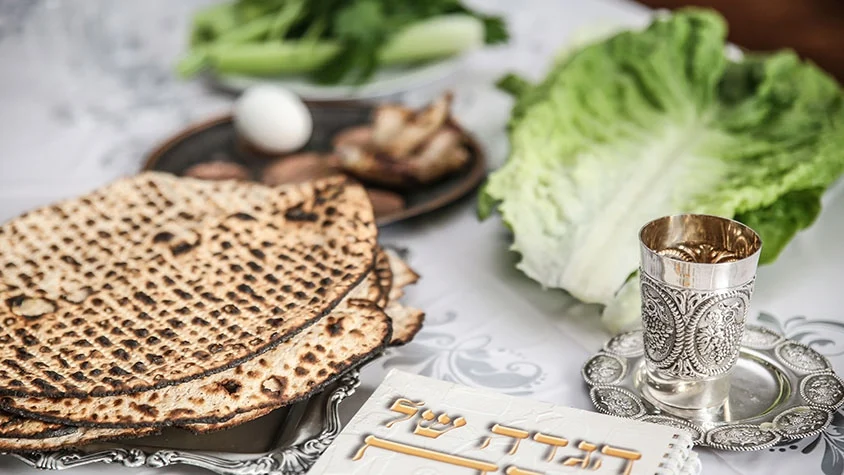
For kosher-certified manufacturers, Passover isn’t just a holiday—it’s a deadline.
It introduces unique, time-sensitive compliance requirements that impact everything from ingredient sourcing to inventory management. Whether or not your company produces Kosher for Passover products, preparation is essential—especially if your business is Jewish-owned.
At OK Kosher, we certify companies regardless of the owners’ religious affiliation. In fact, the majority of our certified clients are not Jewish. But for those who are, Passover carries specific Halachic (Jewish legal) obligations that must be met to maintain kosher status.
Why Passover Matters
Passover is one of the most significant periods in the kosher calendar. This eight-day holiday commemorates the Jewish people’s Exodus from Egypt and centers around themes of freedom, identity, and tradition. It’s observed with symbolic meals (Seders), family gatherings, and strict dietary laws—most notably, the prohibition of chametz, or leavened grain products.
This year’s Passover schedule is as follows:
First Seder: Saturday evening, April 12, 2025
Second Seder: Sunday evening, April 13, 2025
Passover ends: Sunday night, April 20, 2025
Note: Passover is based on the Hebrew calendar and begins each year on the 15th of the month of Nissan. As a result, the holiday falls on different dates in the Gregorian calendar from year to year.
Kosher for Passover: Stricter Standards
If you’re producing Kosher for Passover products, you already know the requirements go above and beyond standard kosher certification. Chametz must be entirely excluded—not just from ingredients, but from equipment and production spaces as well. Additional supervision and ingredient sourcing protocols apply, often months in advance.
The restriction of chametz during Passover goes beyond eating. According to Jewish law, a Jew may not benefit from or own any chametz. So even if you’re not manufacturing Passover-specific items, Jewish-owned businesses must sell any chametz in their possession before the holiday in order to maintain kosher certification at your facility.
At OK Kosher, we partner with manufacturers to:
- Support production planning for Kosher for Passover product runs.
- Facilitate the Halachic chametz sale process for Jewish-owned companies.
Our proactive, guided approach is backed by decades of Halachic expertise and real-world food industry insight.
What Is Chametz—and Why Must It Be Sold?
Chametz refers to any leavened product made from wheat, barley, oats, spelt, or rye. These grains, once mixed with water and allowed to rise, are strictly prohibited during Passover according to Jewish law.
If a Jewish-owned business retains ownership of chametz during Passover, that inventory permanently loses its kosher status—even if it was certified before the holiday.
To avoid this, Jewish-owned companies engage in a halachically approved process to sell their chametz to a non-Jew before Passover, and repurchase it afterward. This allows business continuity without compromising kosher compliance.
How the Chametz Sale Works
The Chametz sale, or Mechiras Chametz, is a simple but legally binding process rooted in Jewish law. Here’s how it works:
- The Jewish business owner authorizes a rabbinic authority via Power of Attorney (POA)
- The rabbi formally sells the chametz to a non-Jew before Passover
- The agreement may include the entire facility operations and thereby also cover chametz that is acquired during the holiday
- After Passover, the chametz is repurchased and returned to Jewish ownership
It’s important to note: Products or raw materials involved in the sale do not physically leave the facility. Only their legal ownership is transferred for the duration of Passover. This ensures compliance with Jewish law while avoiding any disruption to production, storage, or inventory continuity.
OK Kosher offers a secure and streamlined online platform to manage the entire process—from submitting your POA to receiving confirmation of the sale—making compliance simple, fast, and stress-free.
Case Study: Manhattan Beer Distributors
For the eighth consecutive year, Manhattan Beer Distributors—the largest single-market beer distributor in the U.S.—has successfully completed the sale of its chametz in partnership with OK Kosher.
This process allows them to operate without interruption during Passover while fully preserving the kosher status of their inventory. It’s a practical example of how Halachic compliance and business continuity can go hand in hand.
Looking Ahead: Start Planning for Passover 2026
With Passover 2025 just around the corner, now is the time for manufacturers to begin planning for Passover 2026—especially if you’re considering Kosher for Passover production.
Whether you’re aiming to meet higher compliance standards or tap into a growing kosher market, OK Kosher is here to support your success year-round—and especially during this season.
Wishing everyone a season filled with renewal, reflection, and joy.
Whether you’re celebrating Passover or embracing the spirit of spring, may it bring peace, meaning, connection—and of course, not just kosher… OK Kosher.


 EN
EN  ZH
ZH  KR
KR  BR
BR  ES
ES  IN
IN  IL
IL 



